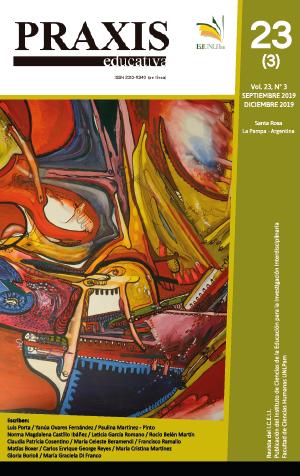Voces noveles sobre la enseñanza de la pronunciación del inglés / The voice of novices on the teaching of English pronunciation
DOI:
https://doi.org/10.19137/praxiseducativa-2019-230306Palavras-chave:
representaciones sociales - enseñanza - fonética y fonología inglesa - huellas memorables - enfoque biográfico narrativoResumo
El presente trabajo se enmarca dentro del Proyecto 2018-2019 Estudiantes y docentes en contextos de formación II: Biografías escolares, narrativas y de diarios de reflexión. Un estudio interpretativo en la formación del Profesorado de Inglés de la Universidad Nacional de Mar del Plata del Grupo de Investigaciones en Educación y Estudios Culturales (GIEEC). Su principal objetivo es interpretar cuáles son las representaciones sociales de un docente de inglés novel sobre la enseñanza de la fonética y la fonología al dar sus primeros pasos como docente universitaria. Para ello, consideraremos la voz de una docente graduada en el año 2014 del Profesorado de Inglés local, obtenida en una entrevista individual de corte biográfico narrativo. Intentaremos comprender cómo su biografía personal y profesional deja huellas memorables en la construcción de sus representaciones sobre la enseñanza de la pronunciación del inglés, y cómo éstas influyen en la forma de pensar su práctica.
Downloads
Referências
Acar, A. (2006). Models, Norms and Goals for English as an International Language Pedagogy and Task Based Language Teaching and Learning. TheAsian EFL Journal, 8(3) 174-191 .Recuperado de http://www.asian-efl-journal.com/Sept_06_aa.php.
Andrea. (2016).Entrevista en persona. Mar del Plata, Buenos Aires, Argentina.
Bain, K. (2004). Lo que hacen los mejores profesores universitarios. Barcelona: Publicaciones Universitat de Valencia.
Bolívar, A., Domingo, J. y Fernández, J. (2001). La investigación biográfico-narrativa en educación. Enfoque y metodología. Madrid: La Muralla.
Bourdieu, P. (2003). Campo de poder, campo intelectual- Itinerario de un concepto. Buenos Aires: Quadrata.
Celce-Murcia, M., Brinton, D. y Goodwin, J. M. (1996). Teaching pronunciation: A reference for teachers of English to speakers of other language.Cambridge:CUP.
Clark, J. yYallop, C. (1995),An Introduction to Phonetics and Phonology. Oxford: Blackwell.Crystal, D. (2003). English as a global language. Cambridge: Cambridge University Press.
Day, C. (2006). Pasión por enseñar. La identidad personal y profesional del docente y sus valores. Madrid: Narcea.
Jenkins, J. (2000). The Phonology of English as an International Language. Oxford: OUP.
McKay, S. L. (2003). Toward an appropriate EIL pedagogy: Re-examining common ELT assumptions. International Journal of Applied Linguistics, 13(1), 1-22.
Moscovici, S. (1961).La psychanalyse, son image et son public. Paris: FEU.
Sarasa, M.C.(2006). Una aproximación a la docencia universitaria desde la óptica de Pierre Bourdieu. En Porta, L. y Sarasa M. C. (comps), Miradas críticas en torno a la formación docente y condiciones de trabajo del profesorado.149-182. Mar del Plata: Universidad Nacional de Mar del Plata.
Strevens, P. (1992). English as an international language: directions in the 1990s. EnKachruB. B.,The other tongue: English across cultures.27- 55.Urbana: University of Illinois Press.
Vasilachis de Gialdino, I. (2006). La investigación cualitativa. EnVasilachisdeGialdino, I. (comp), Estrategias de Investigación cualitativa. 23- 60 Barcelona: Gedisa.
Downloads
Publicado
Edição
Seção
Licença
Aviso de direitos autorais
Comitê Editorial Revista Práxis Educativa:
Declaro que sou o autor do artigo intitulado (nome do artigo), que o mesmo é original e de minha autoria e que não foi publicado anteriormente em qualquer outro formato ou meio. Declaro saber que a revista não me cobrará nenhum tipo de taxa em hipótese alguma, nem receberei qualquer tipo de remuneração monetária.
Caso seja aceito para publicação na Práxis Educacional, autorizo a referida revista a publicá-lo digitalmente e a divulgá-lo em suas redes sociais.
Se o trabalho for publicado, aderi à licença Creative Commons denominada "Atribuição - Compartilhamento Não Comercial pela mesma Licença CC BY-NC-SA", por meio da qual é permitido copiar, reproduzir, distribuir, comunicar publicamente o trabalho e gerar trabalhos derivados , desde que o autor original seja citado e reconhecido. Esta licença está em uso desde setembro de 2018. Em 2016 foi aderido ao CC BY NC ND 4.0; e nos anos de 2017 e 2018 (janeiro-agosto) CC BY NC 4.0.
Esta licença CC BY-NC-SA Share Alike não permite, entretanto, o uso comercial da obra. Como autor, a revista poderá estabelecer acordos adicionais para a distribuição não exclusiva da versão do trabalho publicado na revista, permite-me autoarquivar os artigos publicados, na sua versão post-print, em repositórios institucionais, temáticos , páginas web pessoais ou qualquer outro uso relevante. com o reconhecimento de ter sido publicado pela primeira vez nesta revista.
SA Práxis Educacional adere à DORA (Declaração sobre Avaliação de Pesquisa) assinada em São Francisco, Califórnia, em 16 de dezembro de 2012, e à Declaração do México (Declaração Conjunta LATINDEX - REDALYC - CLACSO - IBICT).















_(1)2.png)


3.png)











_(2).png)






2.jpg)









